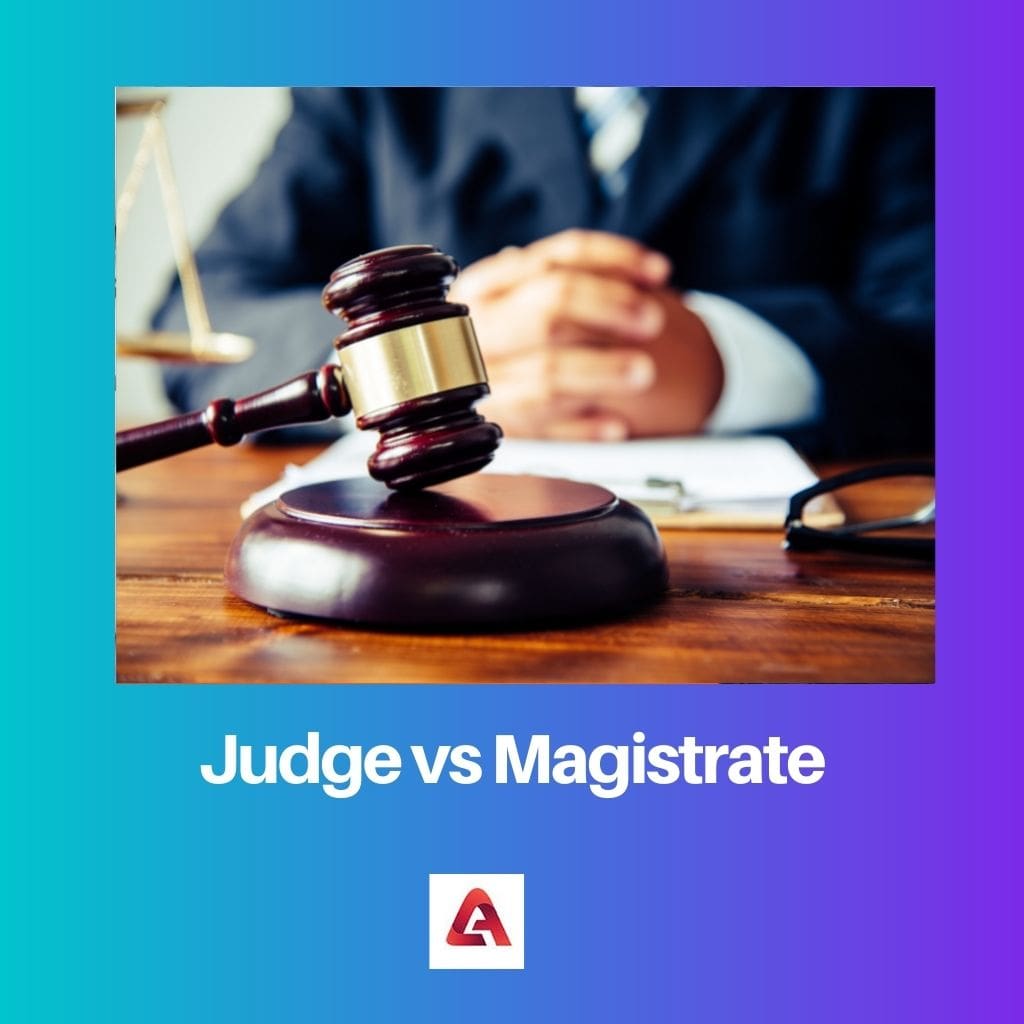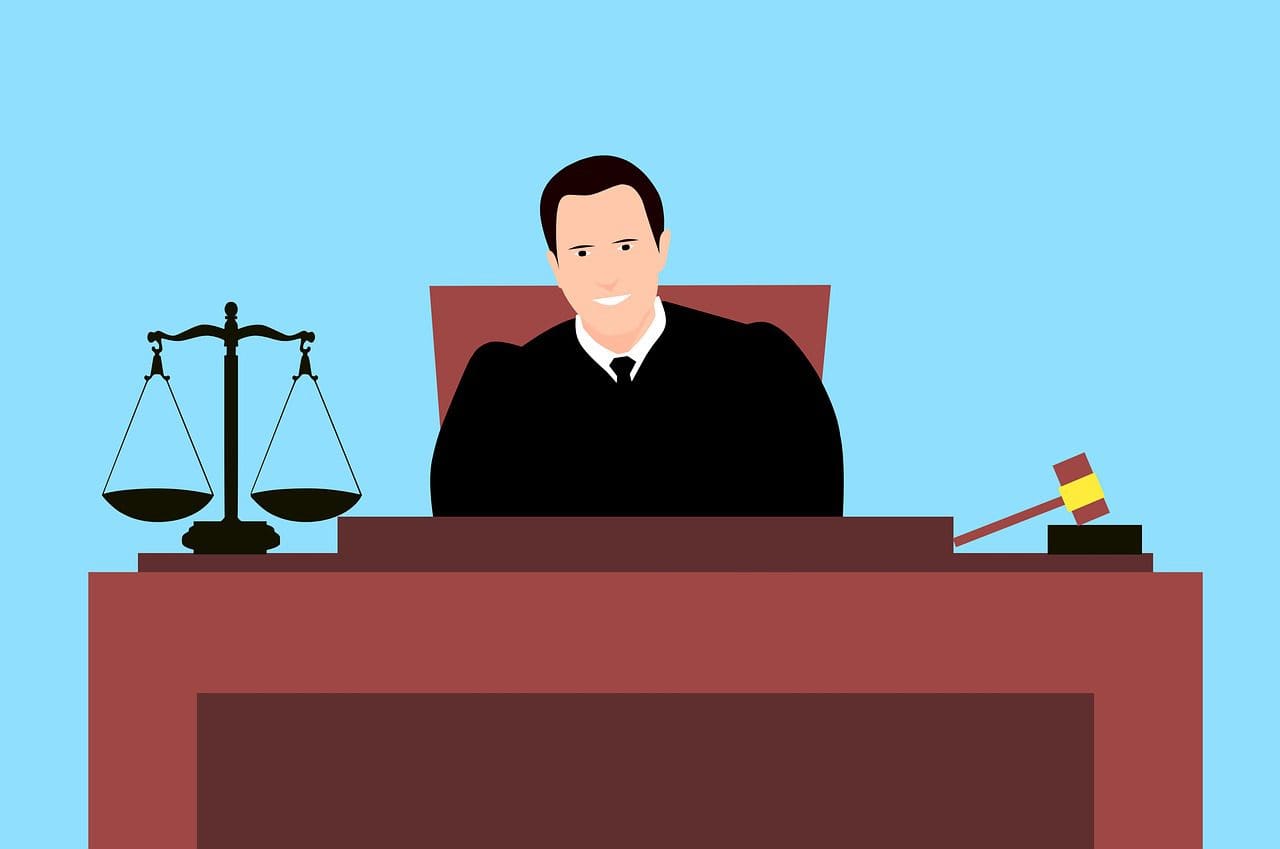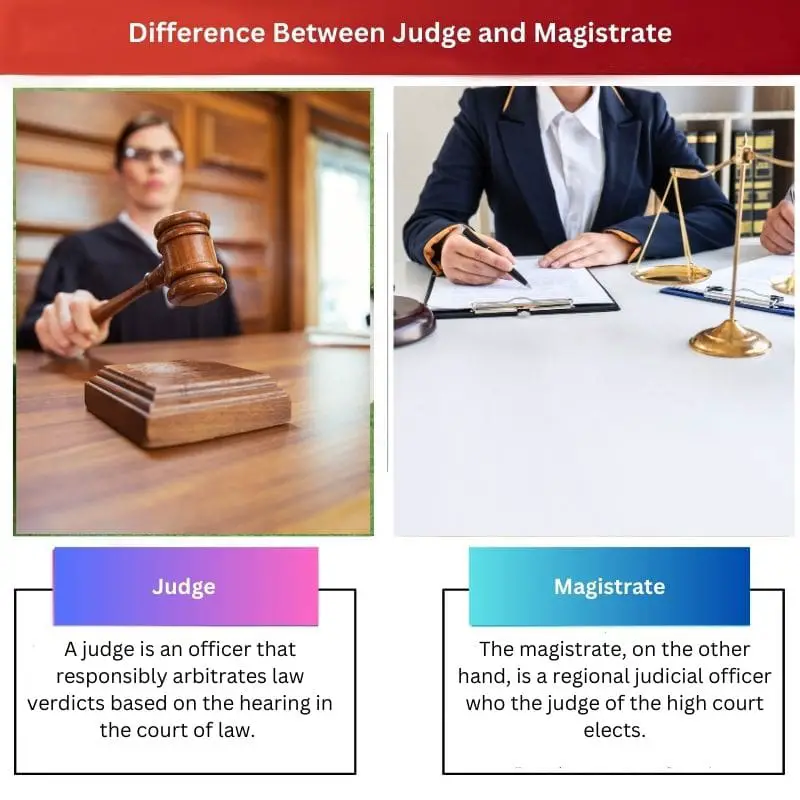A judge is a judicial officer appointed to preside over court proceedings, interpret and apply the law, and deliver judgments in legal cases. A magistrate, on the other hand, handles less serious criminal matters, conducts preliminary hearings, issues warrants, and may oversee certain civil proceedings, within a limited jurisdiction.
Key Takeaways
- Judge is a legal professional who presides over court proceedings and renders judgments based on the law.
- A magistrate is a judicial officer with limited jurisdiction over certain cases and performs administrative functions.
- Judge has broader jurisdiction and more authority than a magistrate and can hear a more comprehensive range of cases.
Judge vs Magistrate
A judge is a legal professional who presides over a court of law and is responsible for making legal decisions. They must have a law degree and several years of legal experience. A magistrate is a legal professional who presides over a court of law and is responsible for making decisions in certain types of cases.

The Judge works at the national level. In short, the magistrate looks after a limited domain, whereas the judge handles the law enforcement powers at the jurisdiction level.
Comparison Table
| Feature | Judge | Magistrate |
|---|---|---|
| Role | Presides over court proceedings and delivers verdicts in legal cases | Handles minor cases and preliminary proceedings in lower courts |
| Authority | Holds higher authority, able to preside over a wider range of cases and issue harsher punishments | Holds lower authority, limited to specific types of cases and lesser punishments |
| Qualification | Requires a law degree and extensive legal experience | May or may not require a law degree, depending on the jurisdiction |
| Appointment | Typically appointed by a higher authority, such as the president or governor | Appointed by a higher judicial body, such as the High Court |
| Case complexity | Handles more complex and serious cases, such as felonies and civil lawsuits | Handles less complex and less serious cases, such as misdemeanors, traffic violations, and small claims |
| Sentencing power | Can impose a wider range of sentences, including life imprisonment and the death penalty (where applicable) | Has limited sentencing power, restricted to fines, community service, and short jail terms |
Who is Judge?
A judge is a highly esteemed legal professional vested with the authority to preside over court proceedings, interpret and apply the law, and render decisions in legal disputes. Their role is pivotal in ensuring fair and impartial administration of justice within the legal system.
Responsibilities of a Judge
- Presiding over Court Proceedings: Judges oversee trials and hearings, ensuring that legal procedures are followed, evidence is presented appropriately, and all parties receive a fair hearing. They maintain order in the courtroom and ensure that the proceedings adhere to legal standards.
- Interpreting and Applying the Law: Judges analyze the facts of a case in conjunction with relevant statutes, precedents, and legal principles to reach a reasoned judgment. They interpret the law and apply it to the specific circumstances of each case, ensuring consistency and adherence to legal standards.
- Rendering Decisions: Judges deliver judgments based on their interpretation of the law and the facts presented during the trial. These decisions may involve rulings on guilt or innocence in criminal cases, liability or damages in civil disputes, or other legal matters brought before the court.
- Ensuring Fairness and Impartiality: Judges are expected to uphold the principles of justice by maintaining impartiality, fairness, and integrity throughout the legal process. They must remain neutral and unbiased, ensuring that all parties are afforded due process and equal treatment under the law.
- Setting Legal Precedent: In cases where legal issues are novel or controversial, judges’ decisions may establish legal precedents that guide future interpretations of the law. These precedents contribute to the development and evolution of the legal system, shaping the application of law in subsequent cases.
- Supervising Court Personnel: Judges may also oversee court staff, including clerks, bailiffs, and court reporters, to ensure the efficient operation of the courtroom and the administration of justice.

Who is Magistrate?
A magistrate is a judicial officer with limited authority, responsible for presiding over minor criminal cases, conducting preliminary hearings, issuing warrants, and overseeing certain civil proceedings within a specified jurisdiction. Magistrates play a vital role in the legal system, handling a variety of matters at the grassroots level of the judiciary.
Responsibilities of a Magistrate
- Presiding over Minor Criminal Cases: Magistrates adjudicate minor criminal offenses, such as misdemeanors and infractions, which do not warrant a trial before a higher court. They may hear cases involving traffic violations, petty theft, disorderly conduct, and other low-level offenses.
- Conducting Preliminary Hearings: Magistrates conduct preliminary hearings to determine whether there is sufficient evidence to proceed to trial in felony cases. During these hearings, they assess the prosecution’s evidence and listen to witness testimony to establish probable cause for the charges.
- Issuing Warrants and Summonses: Magistrates have the authority to issue arrest warrants, search warrants, and summonses in criminal cases. They review applications from law enforcement agencies and prosecutors, ensuring that there is probable cause to justify the issuance of such legal instruments.
- Overseeing Civil Proceedings: In addition to their role in criminal matters, magistrates may preside over certain civil proceedings, such as small claims cases, landlord-tenant disputes, and civil infractions. They facilitate the resolution of these disputes through mediation, arbitration, or adjudication, depending on the nature of the case.
- Conducting Bail Hearings: Magistrates may conduct bail hearings to determine whether to grant pretrial release or set bail conditions for individuals accused of criminal offenses. They consider factors such as the severity of the charges, the defendant’s criminal history, and the risk of flight or harm to the community when making bail decisions.
- Facilitating Settlements: Magistrates encourage parties involved in civil disputes to explore settlement options outside of formal court proceedings. They may facilitate negotiations between opposing parties, helping them reach mutually acceptable resolutions and avoid prolonged litigation.
- Administering Oaths and Affirmations: Magistrates have the authority to administer oaths and affirmations to witnesses, jurors, and other individuals involved in legal proceedings, ensuring their truthful testimony and compliance with legal requirements.

Main Differences Between Judge and Magistrate
- Authority and Jurisdiction:
- Judges serve in higher courts and have broader authority, hearing a wide range of cases including serious criminal matters, civil disputes, and appeals.
- Magistrates operate within a limited jurisdiction, handling minor criminal cases, preliminary hearings, and certain civil proceedings at a lower level of the judiciary.
- Legal Training and Qualifications:
- Judges possess extensive legal education and experience, including law degrees and significant practice as attorneys before their appointment to the bench.
- Magistrates may have varying levels of legal training, ranging from law degrees to specialized training programs, but they do not require the same level of formal legal qualifications as judges.
- Scope of Responsibilities:
- Judges have comprehensive responsibilities, including presiding over trials, interpreting and applying the law, rendering judgments, and setting legal precedents.
- Magistrates’ responsibilities are more focused on specific tasks such as conducting preliminary hearings, issuing warrants, overseeing minor criminal cases, and facilitating settlements in civil disputes.
- Decision-Making Authority:
- Judges have the ultimate authority to make legally binding decisions in cases they preside over, based on their interpretation of the law and the evidence presented.
- Magistrates’ decisions may be subject to review by higher courts, and their authority is limited to making recommendations, issuing orders, or conducting proceedings within the scope of their jurisdiction.
- Level of Formality:
- Court proceedings presided over by judges tend to be more formal and structured, with adherence to strict legal procedures and protocols.
- Magistrates handle less formal proceedings, particularly in minor criminal and civil matters, where the emphasis may be on efficiency and accessibility for litigants without legal representation.
- Appellate Review:
- Judges’ decisions can be appealed to higher courts, where appellate judges review the legal and factual issues raised in the case and may overturn or uphold the lower court’s decision.
- Magistrates’ decisions may also be subject to review, but within the framework of specific procedures established for the jurisdiction or type of case involved.

- https://scholarship.law.nd.edu/cgi/viewcontent.cgi?article=1300&context=ndjlepp
- https://www.littler.com/files/romanian_judges_forum.pdf
- https://www.fclr.org/fclr/articles/html/1999/fedctslrev4.pdf
The comparison table is particularly helpful in highlighting the distinctions between judges and magistrates. It provides a clear breakdown of their varying roles and functions.
Agreed. The table nicely summarizes the key features and characteristics of judges and magistrates.
Indeed, the table format makes it easier to grasp the disparities between these legal professionals.
The article is informative and addresses the key differences between judges and magistrates effectively.
The delineation of the role and responsibilities of magistrates provides valuable insights into their adjudicatory functions within the legal system.
Absolutely, the clarity on the adjudicative role of magistrates is commendable. It enhances the understanding of their distinct judicial functions.
The post effectively outlines the essential responsibilities undertaken by magistrates, offering a comprehensive understanding of their contributions.
I appreciate the comprehensive comparison between a judge and a magistrate. It’s crucial to understand the difference in their jurisdictions and appointment processes.
Absolutely, the breakdown of their roles and responsibilities provides a clear understanding of their significance within the legal system.
The discussion on continuing legal education for judges showcases the commitment to staying informed about evolving legal interpretations. It underscores the importance of ongoing professional development for judges.
Indeed, the article rightly highlights the significance of continuous learning in the legal domain for judges.
The article’s elucidation of the appointment and qualifications of judges is particularly enlightening. It offers valuable insights into the rigorous process of selecting judges.
Absolutely, the emphasis on the qualifications and expertise required for becoming a judge is well-articulated.
The article’s explication of the types of judges, including Supreme Court justices and appellate judges, adds depth to the understanding of judicial roles within the legal system.
Absolutely, the distinctions between these judicial roles are vital in appreciating the various contributions of judges in different legal contexts.
The article provides a detailed overview and comparison of judges and magistrates. The level of authority and types of cases handled by each are well explained.
Yes, the explanation of their training and experience requirements sheds light on the qualifications needed for these positions.
I found the details on the independence and impartiality of judges to be thought-provoking. It underscores the critical role of neutrality in judicial proceedings.
This post presents a thorough analysis of the roles and responsibilities of judges and magistrates. The distinction between their decision-making powers is enlightening.
Absolutely, understanding the difference in their judicial authority is essential in comprehending their respective contributions to the legal system.
I concur. The insights into their sentencing authority and jurisdictions provide valuable information about their legal roles.